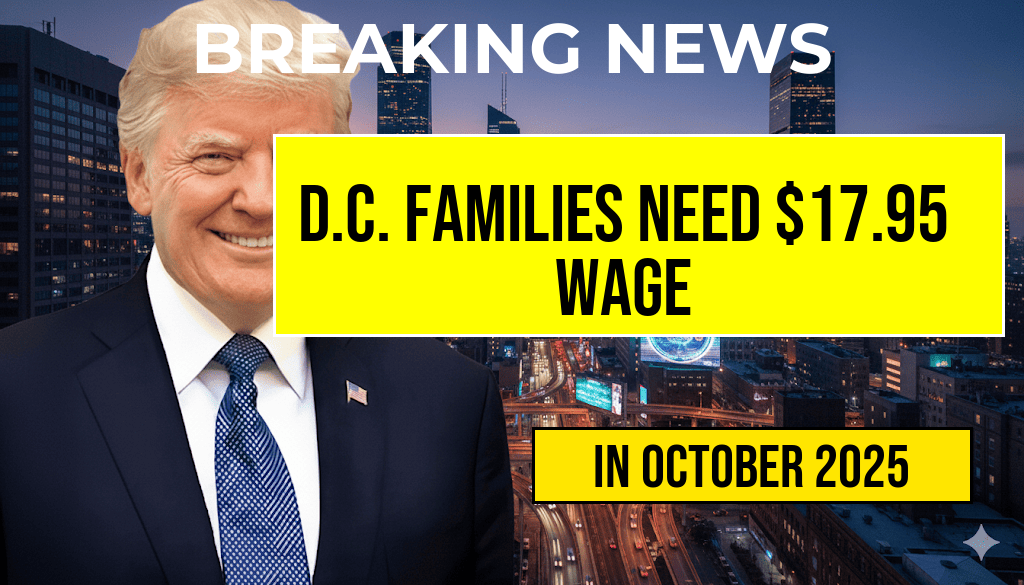DC Families Need a Minimum Wage of $17.95 to Earn $3,111 Monthly Before Taxes
For families living in Washington, D.C., achieving a modest monthly income of approximately $3,111 before taxes requires earning at least $17.95 per hour. This figure reflects the area’s high living costs, including housing, transportation, and childcare expenses, which significantly outpace national averages. According to recent analyses by economic research organizations, setting a minimum wage at this level would help many families meet essential needs without financial strain. The calculation assumes full-time employment of 40 hours per week and considers the current tax landscape, highlighting the gap between existing minimum wages and the income needed for a basic standard of living in the nation’s capital. As policymakers debate potential wage increases, understanding the precise hourly rate necessary for financial stability becomes critical for shaping effective economic strategies.
Understanding the Income Threshold in Washington, D.C.
Washington, D.C., boasts one of the highest living costs among U.S. cities, driven primarily by soaring housing prices and high service costs. According to recent data from the Bureau of Labor Statistics, the median rent for a one-bedroom apartment exceeds $2,000 per month, while childcare and transportation add further financial burdens. To cover these expenses and maintain a basic standard of living, families need to earn significantly more than the federal minimum wage of $7.25 or even the D.C. minimum of $15.20 (as of 2023). The calculation for a living wage considers not only housing but also health insurance, utilities, food, and other necessities, culminating in an estimated $17.95 hourly rate for a family of four to reach a monthly income of $3,111 before taxes.
Breakdown of Essential Expenses
| Expense Category | Average Monthly Cost |
|---|---|
| Housing (Rent) | $2,200 |
| Childcare | $800 |
| Utilities & Internet | $300 |
| Food | $700 |
| Transportation | $300 |
| Health Insurance & Medical | $600 |
| Miscellaneous & Savings | $200 |
Adding these expenses yields a total of roughly $5,100 per month, but the calculation for a living wage focuses on income needed to cover just basic needs, approximating $3,111. This figure is designed to support families without relying on public assistance or credit, aiming for financial independence within the urban environment.
Implications for Policy and Wage Standards
The analysis illustrates that the current minimum wages in Washington, D.C., fall short of supporting a family’s basic needs. While the city’s minimum wage increased to $15.20 in 2023, many families still struggle to afford housing and childcare, leading to increased reliance on social programs. Advocates argue that raising the minimum wage to approximately $17.95 would narrow this gap, providing a more realistic foundation for economic security.
Recent proposals in D.C. include phased wage increases and targeted support for low-income families, reflecting a broader national conversation about living wages and economic fairness. Experts from organizations like the Economic Policy Institute emphasize that wages should align with the cost of living to prevent working families from falling behind. Implementing such changes may also have positive effects on local economies by increasing consumer spending and reducing poverty-related costs.
Balancing Economic Growth and Worker Welfare
City officials face the challenge of balancing economic growth with the needs of working families. While raising the minimum wage can improve living standards, concerns about potential impacts on employment levels and small businesses persist. Studies indicate that moderate increases, such as to $17.95, can be absorbed without significant job losses, especially when paired with supportive policies like earned income tax credits and affordable housing initiatives.
For families in Washington, D.C., the path to economic stability hinges on policies that recognize the city’s unique fiscal landscape. Ensuring that wages keep pace with living costs is pivotal for fostering a more equitable urban environment where all residents can thrive.
Frequently Asked Questions
What is the minimum wage required for D.C. families to earn $3,111 monthly before taxes?
The minimum wage needed for D.C. families to earn a monthly income of $3,111 before taxes is $17.95 per hour.
How is the minimum wage calculated to reach a $3,111 monthly income?
The calculation considers a standard full-time work schedule of 40 hours per week over approximately 4.33 weeks per month, multiplying the hourly wage by 40 hours and then by 4.33 to determine monthly earnings.
Why is the minimum wage of $17.95 significant for D.C. families?
The $17.95 minimum wage is significant because it represents the hourly rate necessary for families to meet their basic monthly income needs of $3,111 before taxes, supporting financial stability.
Does this minimum wage account for taxes and other deductions?
No, the $17.95 hourly wage is calculated before taxes, so families may need to earn slightly more to cover taxes and other deductions to reach a net income of $3,111.
How does the minimum wage in D.C. compare to other regions for similar income levels?
Compared to other regions, the $17.95 hourly minimum wage in D.C. aligns with higher living costs, ensuring families can earn a sufficient monthly income of $3,111 before taxes, which may be higher than minimum wages in less costly areas.

Leave a Reply